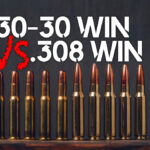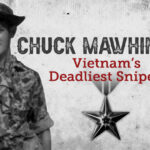
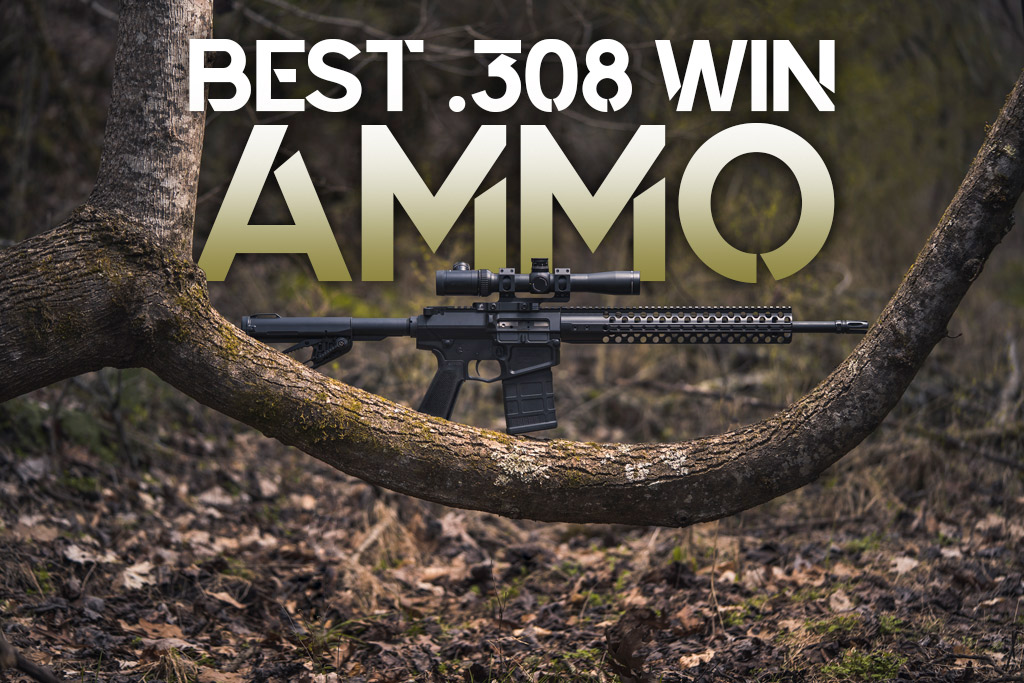
As far as short-action, high-powered centerfire rifle calibers go, the .308 Winchester and its clone the 7.62X51mm NATO are the reigning champs. The best .308 ammo is easy to find, and every possible type of bullet is available. Why? It’s because it’s a solid performer, and it shares the exact same bullet as its stalwart big brother, the .30-06 Springfield (and even bigger brother, the .300 Winchester Magnum).
.308 Winchester has proven over many decades to be a very capable battle rifle cartridge as well (G3, M1A/M14). During this time it solidified its legacy as a sharpshooter cartridge (M24, M40). Its also a very efficient hunting caliber, not to mention a medium machine gun caliber in the M60, M240, and the M134 Minigun. We’ll also explore the best .308 Win ammo for your purpose and discuss factors to consider when purchasing.
The Best .308 Ammo
There are quite a few options out there when it comes to .308 Win ammo. We narrowed our list down to a few optimal choices, which include the following:
Best .308 Target Shooting Ammo
It is important to understand why FMJ bullets are mass-produced and used for training. They are not often selected for match shooting. FMJs are the cheapest, easiest, and fastest way to produce bullets. They were intended for use in semi-automatic and automatic weapons for the reliability of feeding, not precision accuracy. This is not to suggest that they are akin to round musket balls; far from it. The average modern battle rifle with basic FMJ target ammo is many times for accurate than sharpshooting rifles of yesteryear.
PMC Bronze 147-Grain FMJ
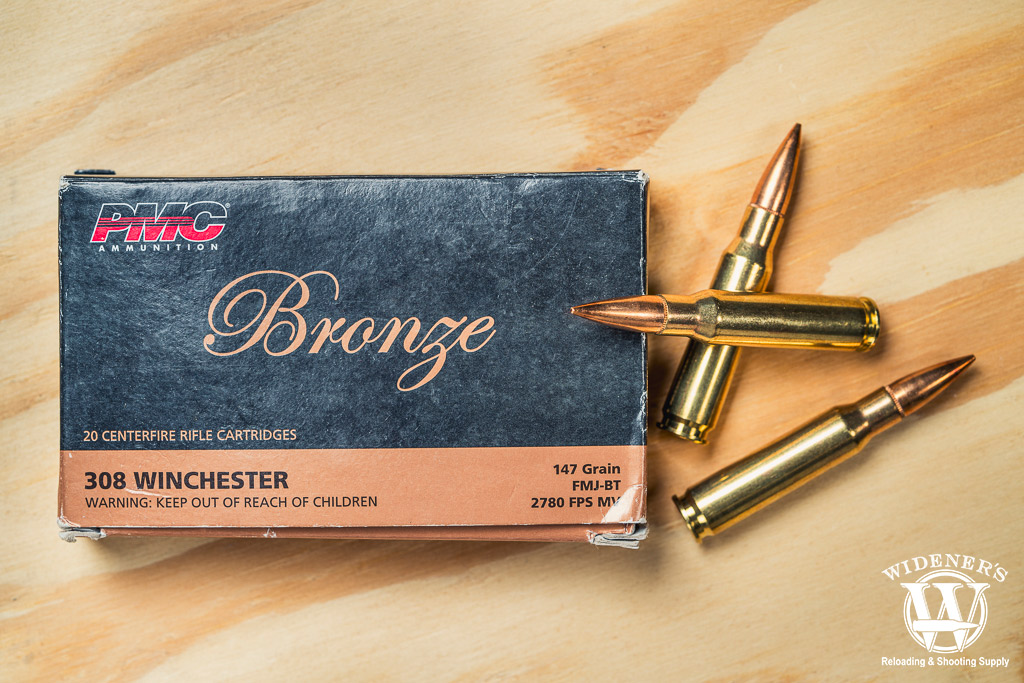
Never mind the question. The answer is PMC Bronze, because who doesn’t love cheap thrills?
When you think of South Korea, quality ammunition may not be the first thing that comes to mind. Thankfully, that’s where Precision Made Cartridges (PMC) comes in. Since 1973 they’ve been cranking out some of the finest import ammo on the planet. Ask any top-level competitor what their go-to practice round is, and you’ll get the same answer. These projectiles leave the muzzle at 2,780 FPS and push out 2,522-lbs of energy.
| Caliber | Bullet Type | Bullet Weight | Velocity (Muzzle) | Energy (Muzzle) | 100 Yards (Velocity/Energy) | 200 Yards (Velocity/Energy) | 300 Yards (Velocity/Energy) |
|---|---|---|---|---|---|---|---|
| .308 Win | FMJ | 147gr | 2,780 FPS | 2,522 FT LBS | 2,575 FPS/2,164 FT LBS | 2,380 FPS/1,849 FT LBS | 2,194 FPS/1,571 FT LBS |
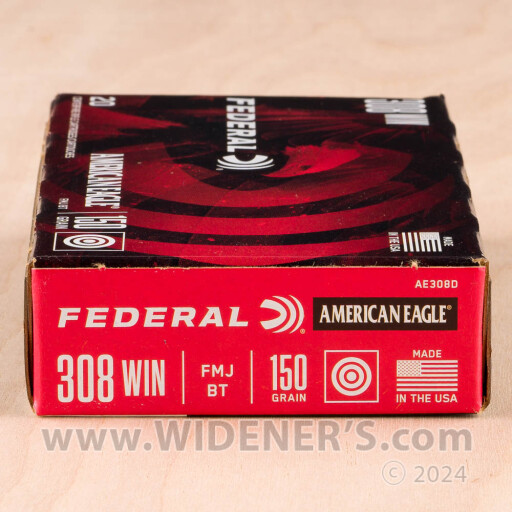
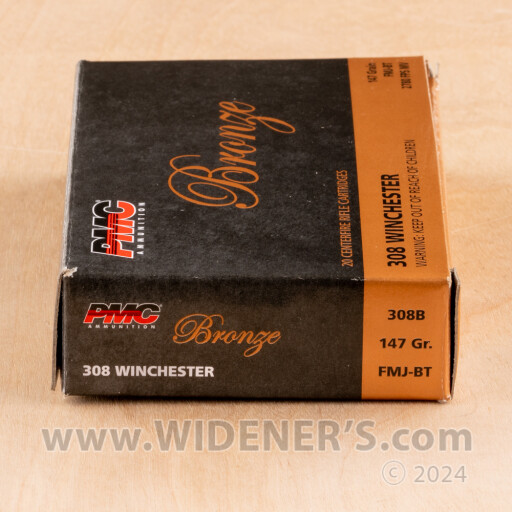
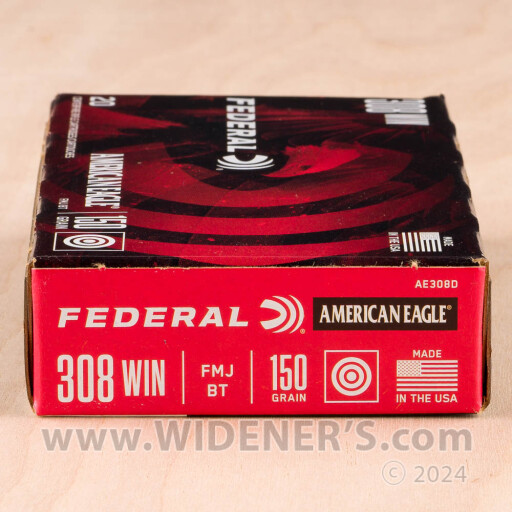


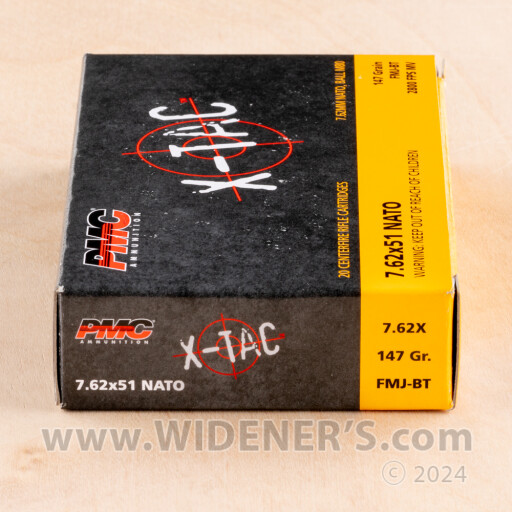
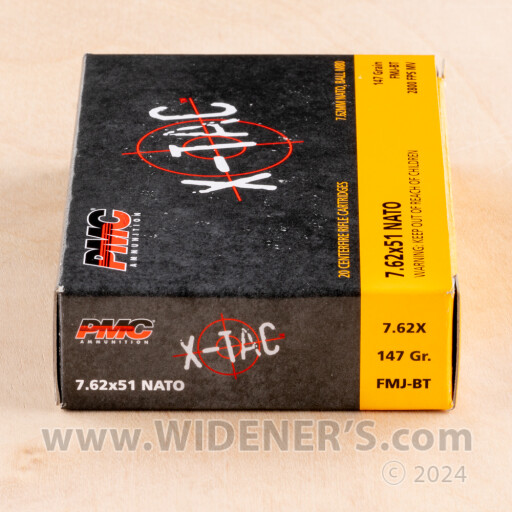


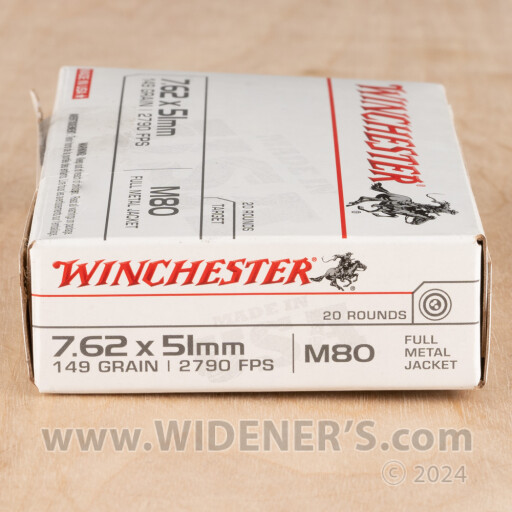

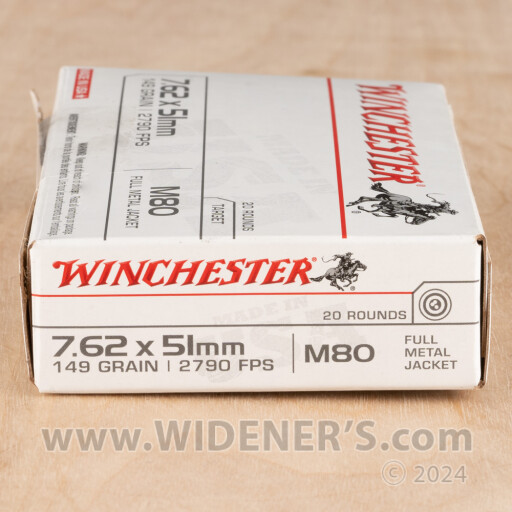
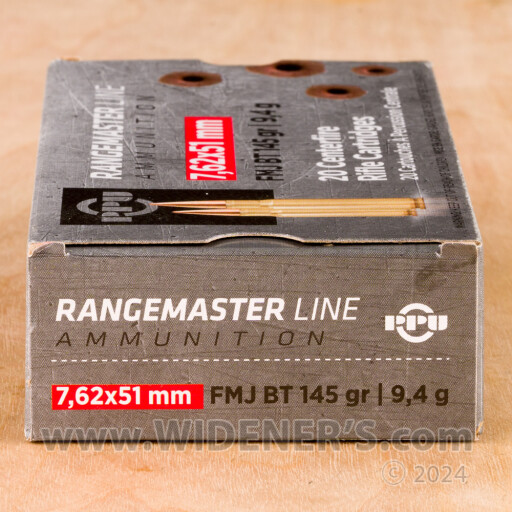
Wolf Polyformance 145-Grain FMJ
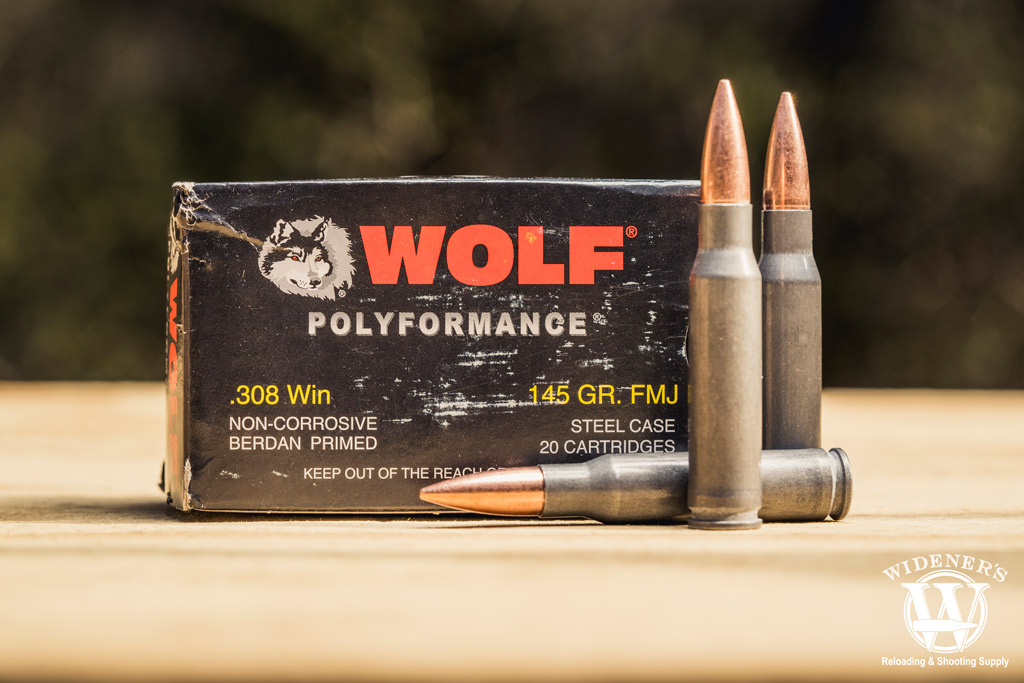
Wolf may run with its own pack, but it also runs great in modern .308 rifles, with an excellent price point.
The name is a little confusing considering the recent rise in popularity of polymer-tipped rifle bullets. The Wolf Polyformance is actually an inexpensive steel-cased round. It has had a light film of polymer-coated over the steel case. It fires a standard 145gr. FMJ bullet at a predictable 2,800fps and 2,611ft-lbs of energy at the barrel. It doesn’t burn particularly clean, but clean shooting precision is not the goal of Wolf; their goal is providing reliable, bulk ammunition at a fraction of the cost of American manufacturers and they do a great job of that.
| Caliber | Bullet Type | Bullet Weight | Velocity (Muzzle) | Energy (Muzzle) | 100 Yards (Velocity/Energy) | 200 Yards (Velocity/Energy) | 300 Yards (Velocity/Energy) |
|---|---|---|---|---|---|---|---|
| .308 Win | FMJ | 145gr | 2,750 FPS | 2,519 FT LBS | 2,544 FPS/2,155 FT LBS | 2,346 FPS/1,833 FT LBS | 2,157 FPS/1,550 FT LBS |













Best .308 Hunting Ammo
The primary use for the .308 cartridge in North America is big game hunting. With the right .308 cartridge loaded into your chamber, you can confidently take on wild hogs, deer, moose, elk, and even bear. With that in mind, here are a couple of highly recommended hunting rounds.
Winchester Deer Season XP 150-Grain Poly
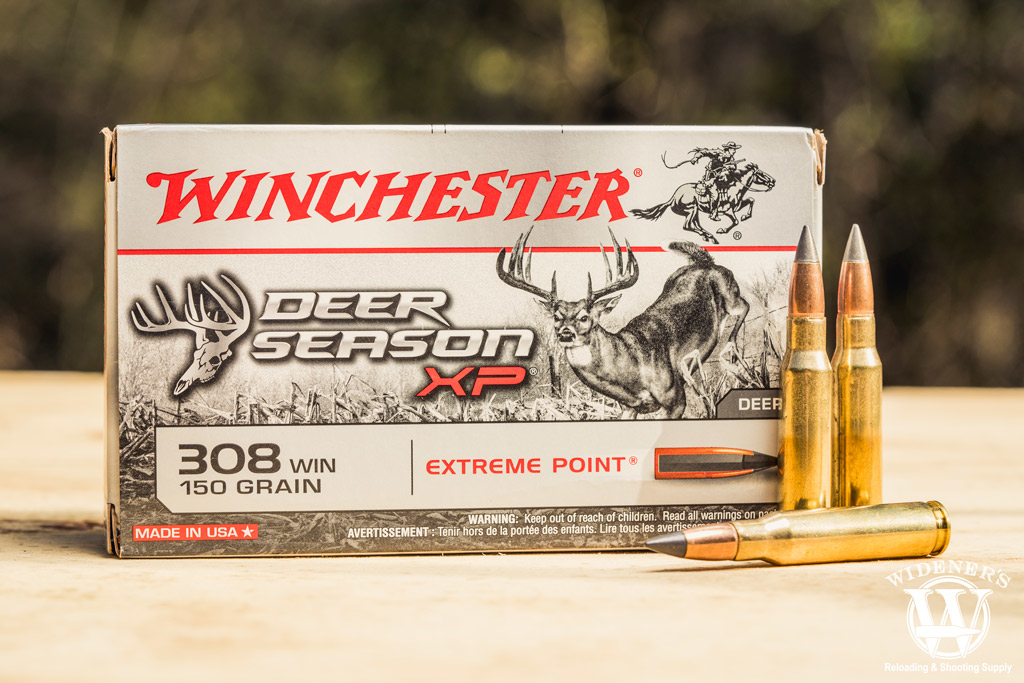
Winchester knows hunters need fast, accurate bullets with a flat trajectory that put meat on the table.
Riding the wave of popularity of polymer-tipped hunting cartridges, Winchester offers the Deer Season XP 150gr. It is an average weight for a deer hunting .30 caliber bullet, identical in fact to their .300 AAC and .30-06 offerings. It exits at 2,820 fps, and holds strong at 2,588 fps at 100 yards.
| Caliber | Bullet Type | Bullet Weight | Velocity (Muzzle) | Energy (Muzzle) | 100 Yards (Velocity/Energy) | 200 Yards (Velocity/Energy) | 300 Yards (Velocity/Energy) |
|---|---|---|---|---|---|---|---|
| .308 Win | Poly | 150gr | 2,820 FPS | 2,648 FT LBS | 2,588 FPS/2,231 FT LBS | 2,368 FPS/1,867 FT LBS | 2,158 FPS/1,551 FT LBS |

Federal Fusion 165-Grain SP

Innovation matters to Federal, their Fusion ammo with Nosler tips is designed to drop game with one shot.
Federal offers a few bullet weight options in .308. The polymer tipped Fusion, which uses the Nosler® AccuBond® 165gr. bullet, a boat-tail bullet designed for excellent ballistic co-efficiency, deep penetration, and great weight retention. A little bit slower than the 150gr. Winchester, the Fusion exits at 2,700 fps carrying 2,671ft-lbs, and 2,501 fps with 2,291ft-lbs at 100 yards.
| Caliber | Bullet Type | Bullet Weight | Velocity (Muzzle) | Energy (Muzzle) | 100 Yards (Velocity/Energy) | 200 Yards (Velocity/Energy) | 300 Yards (Velocity/Energy) |
|---|---|---|---|---|---|---|---|
| .308 Win | SP | 165gr | 2,700 FPS | 2,671 FT LBS | 2,501 FPS/2,291 FT LBS | 2,310 FPS/1,955 FT LBS | 2,128 FPS/1,660 FT LBS |

Best .308 Match Grade Ammo
Match ammo is commonly heavier than hunting and target shooting loads, and for good reason: stability. More mass equals higher stability. This is experienced while flying airplanes which is why many people who have never experienced air sickness in an airliner end up retching in a Cessna; the weight of the large aircraft provides stability.
Federal Premium Sierra Matchking Gold Medal 175-Grain HP-BT
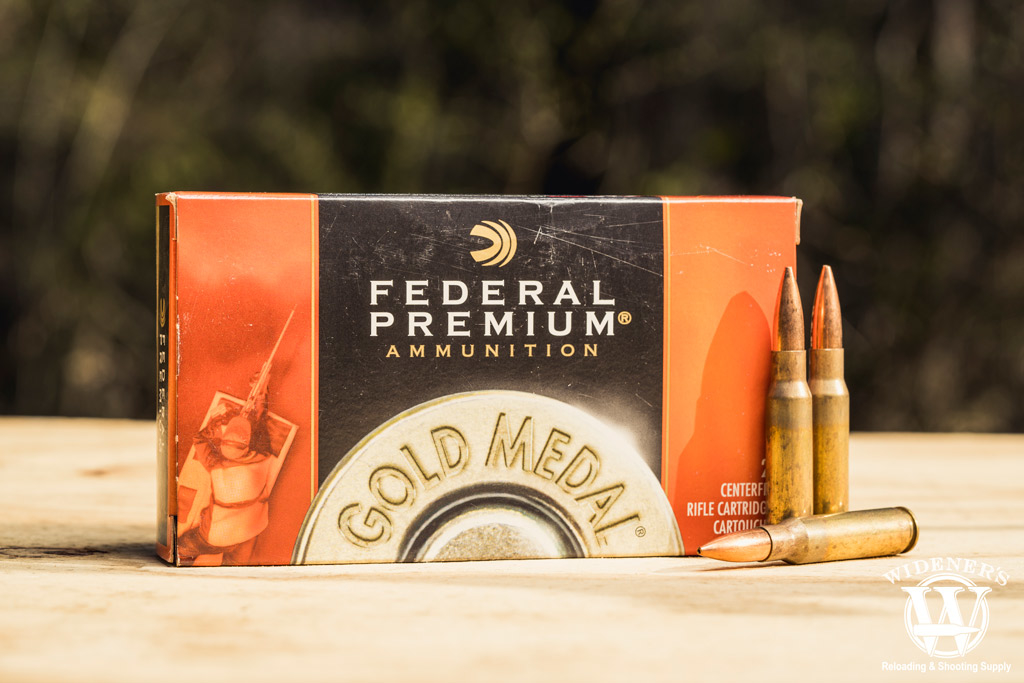
The Sierra Matchking line by Federal is known for accuracy and is a favorite for many match shooters.
Sierra® Matchking® is predictably heavy, weighing in at a staunch 175gr. It is a boat-tail hollow point, the preferred bullet style of match shooters. But why a hollow point? That’s a big question with a long answer since HPs are traditionally thought of as defense and hunting bullets. In a nutshell, the hollow point allows better distribution of bullet mass due to the method of forming the bullet casting.
The Matchking® has excellent characteristics in regards to wind drift, drifting only half an inch at 100 yards in 10mph winds, 2.9” at 200, and less than seven at 300.
| Caliber | Bullet Type | Bullet Weight | Velocity (Muzzle) | Energy (Muzzle) | 100 Yards (Velocity/Energy) | 200 Yards (Velocity/Energy) | 300 Yards (Velocity/Energy) |
|---|---|---|---|---|---|---|---|
| .308 Win | HP | 175gr | 2,600 FPS | 2,627 FT LBS | 2,427 FPS/2,290 FT LBS | 2,262 FPS/1,987 FT LBS | 2,102 FPS/1,717 FT LBS |
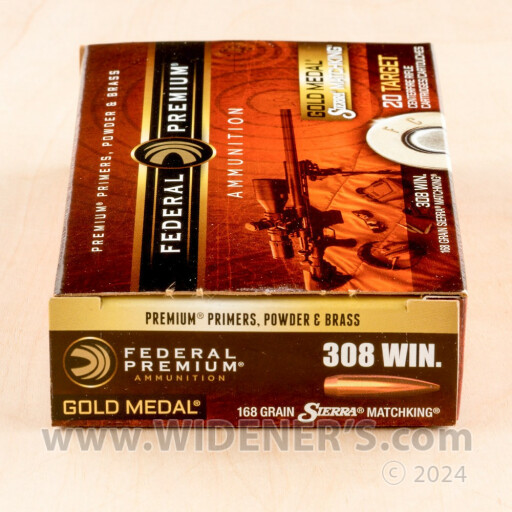
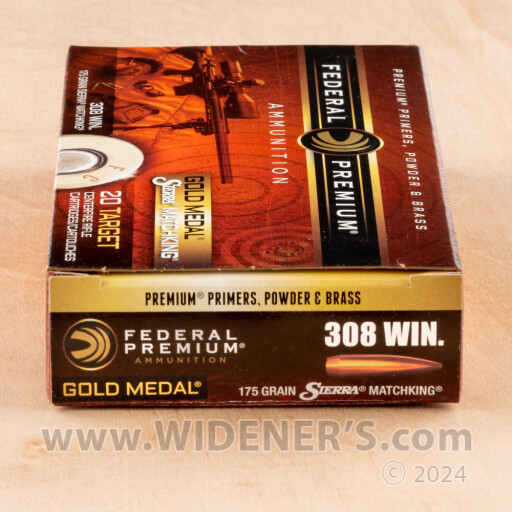
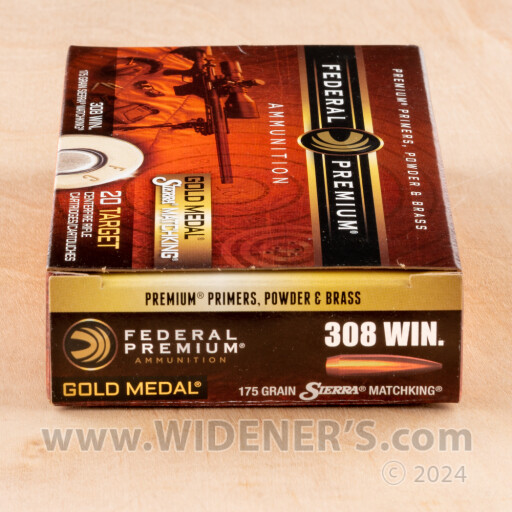
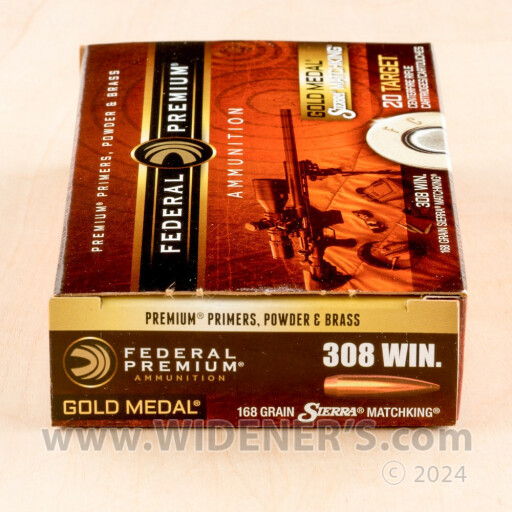
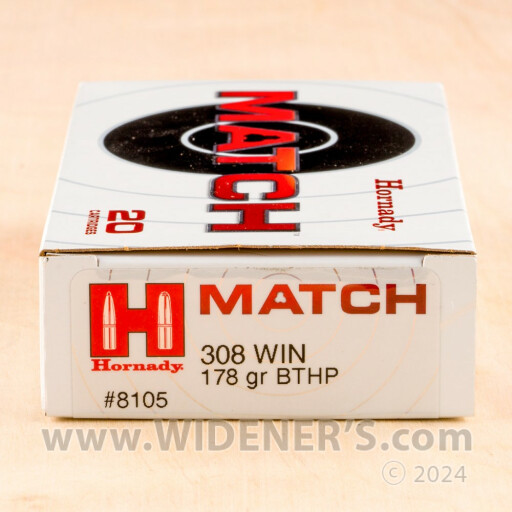
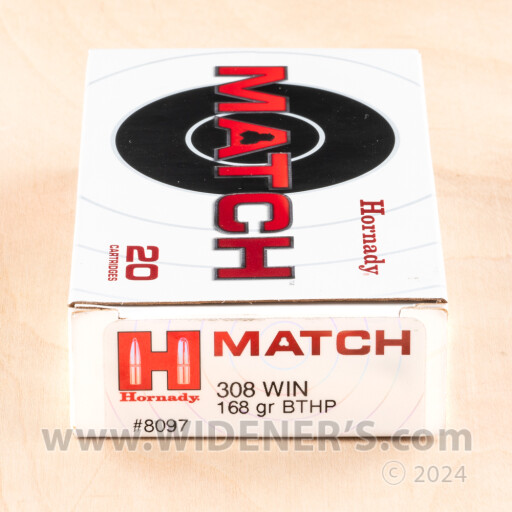
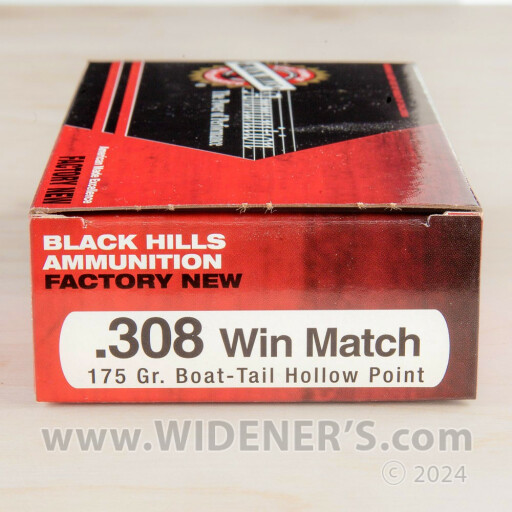

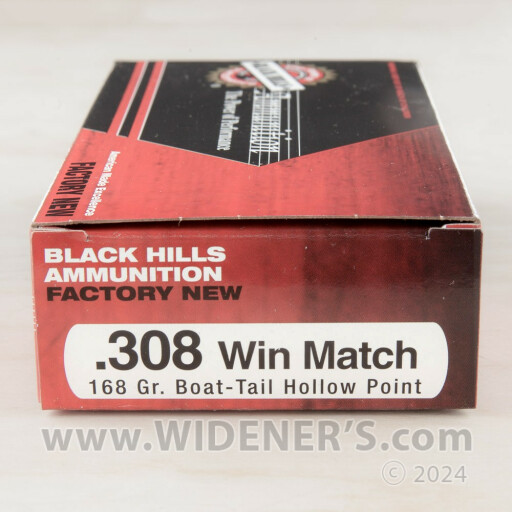
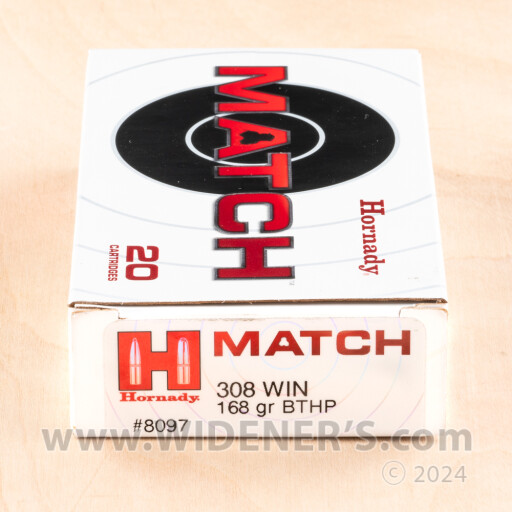
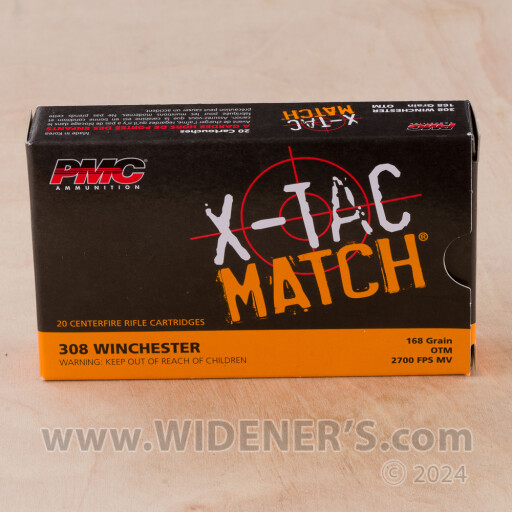
Hornady Match 308 168-Grain HPBT

If you need a round that goes exactly where you place it through your optic, Hornady Match grade is a great choice.
Hornady Match offers a 168gr. HPBT bullet, much the same configuration of all other prominent match bullets. Designed for a 200-yard zero, the 168gr. match bullet exits are 2,700 fps and a powerful 2,719ft-lbs and maintaining 2,314 fps and 1,997ft-lbs at the targeted 200-yard marker.
| Caliber | Bullet Type | Bullet Weight | Velocity (Muzzle) | Energy (Muzzle) | 100 Yards (Velocity/Energy) | 200 Yards (Velocity/Energy) | 300 Yards (Velocity/Energy) |
|---|---|---|---|---|---|---|---|
| .308 Win | HP | 168gr | 2,700 FPS | 2,719 FT LBS | 2,503 FPS/2,337 FT LBS | 2,315 FPS/1,998 FT LBS | 2,134 FPS/1,699 FT LBS |











Cartridge Specs & Overview
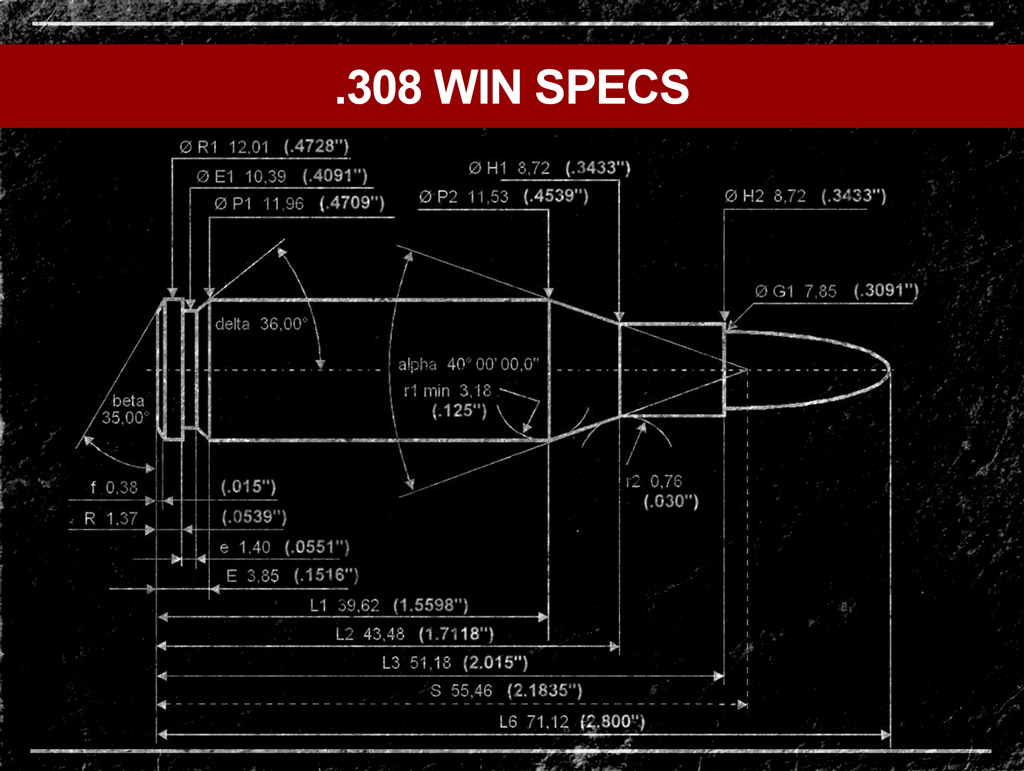
The .308 Winchester shares a bullet with the 30-06 cartridge, but has a diminished case and powder capacity.
The .308 Winchester is known for its versatility and excellent accuracy. With bullet weights ranging from 110 to 185 grains, it can achieve velocities up to 3,500 feet per second (fps) with lighter bullets and maintain effective velocities of 2,500 to 2,700 fps with heavier bullets. This versatility allows shooters to tailor their ammunition choice to the specific game or target.
| Cartridge Specs | .308 Win |
|---|---|
| Parent Casing | .30-06 |
| Bullet Diameter | .308″ |
| Neck Diameter | .343″ |
| Base Diameter | .470″ |
| Case Length | 2.015″ |
| Overall Length | 2.800″ |
| Grain Weight | 110gr-185gr |
| Max Pressure (SAMMI) | 62,000 PSI |
Common .308 Bullet Types
Full Metal Jacket (FMJ)
The NATO standard and standard of shooters the world over. The standard full metal jacket bullet is the bread and butter of all shooters. Are you going to spend over $1 per round on match grade ammo to establish zero on a new optic or before the season opens? Shoot no. You go for your box, bag (yes, I’ve had bulk .308 show up in plastic, unmarked bags), or spam can of 150gr. FMJ to get it lined up.
Jacketed Hollow Point (JHP)
The JHP was once the benchmark standard in terms of anti-personnel and hunting since it creates such devastating terminal effects. Hollow points often double in diameter while retaining nearly all of their mass. They do very well against light targets without heavy bone structures.
Soft Point (SP)
Soft point bullets, or some derivative of those, are the standard bullet type for most game hunting. Why? Ballistic coefficient for one thing. A gaping hole in the tip creates wind resistance which alters the aerodynamic properties of a bullet. Also, when you consider the velocity and energy at which a high-powered rifle bullet strikes a fixed object as compared to a handgun bullet, you come to understand why a rifle bullet can be more rigid and yet still expand radically.
Common Bullet Weights
FMJ bullets usually weigh around 150gr, which is a good middle-ground weight. On average, a 150gr. FMJ possesses a ballistic coefficient of around 0.31 with muzzle velocity around 2,800fps at the muzzle, 2,500fps at 100 yards, and drops from there. Muzzle energy will be between 2,600 and 2,700ft/lbs at the barrel end, which is pretty impressive considering the hard-kicking .30-06 is less than 200ft/lbs higher.
Bullet weights range widely for the .308 which adds a lot to its inherent versatility. HPs designed for the rapidly growing Modern Sporting Rifle market for .308 and 7.62×51 chambered rifles hang around the lighter weight, around 120 grains, which is very close to the supersonic HPs in .300 AAC, and for much the same purpose. There are a few premium lightweight bullets available from Hornady which are 125gr. and are intended for medium game, but for the most part .308 hunting bullets are generally 150gr. or 180gr.
The .308 has great proficiency, you can hunt almost any mid to large-sized game in North America with it. In fact, Hornady even offers a 220gr. round nose bullet which is marketed specifically for dangerous game. When you consider that a 150gr. FMJ is perfectly suitable for coyotes, this gives versatility to the most popular rifle caliber in the world!
Match-grade ammunition tends to be on the heavier end of the spectrum. The obvious reason for this is that it is impacted less by wind drift. Plus, match-grade bullets are longer and generally boat-tailed. They possess a taper at both ends to reduce wind resistance, al la ballistic coefficient. These bullets range anywhere from 155gr. on the lighter end to the more common 168gr. and 178gr. bullets.
History Of The Mighty .308 Cartridge
The .308 Winchester actually precedes the 7.62×51 by a couple of years. It was introduced by Winchester in 1952 for their Model 70, 100, and 88 rifles. It has since become the most popular short action caliber in the world.
The nearly identical 7.62x51mm was adopted by the U.S. military later on in the 1950s. It was intended for use in the M14 service rifle and the M60 machine gun. Both of which continue to be used in some capacity.
.308 Ammo Quick Answer Box:
• What’s the difference between 7.62×51 and .308 ammo? While it is accepted that the .308 Winchester and the 7.62x51mm are interchangeable, they are not identical. The Sporting Arms and Ammunition Manufacturers’ Institute (SAAMI, or ‘Sammy’) has opined and given it the green light to interchangeable use so it is considered perfectly safe to do so, but understand that they are not dimensionally identical and the .308 generally operates at higher pressures.
• Is .308 ammo good for shooting long distances? Yes, the .308/7.62×51 NATO cartridge is an excellent choice for hitting targets well beyond the 300-yard range. A 165 grain .308 bullet with a velocity of 2,820 FPS should be able to effectively hit targets (assuming you have sighted optics and are adjusting for distance, wind, etc.) as far out as 500 yards. Hitting targets as far out as 1,000 yards is possible. However, you do need to be aware of decreased velocity and loss of performance at greater distances.
• Is the AR rifle platform good for shooting .308? Yes, the AR-10 chambered in .308/7.62×51 NATO offers many advantages over the standard bolt-action rifle. Not only can you use high-capacity magazines with the AR-10, you can also install a variety of popular AR-style accessories and optics on your rifle. Eugene Stoner knew what he was doing when he designed his modular Armalite battle rifle and chambered it in .308.
The .308 Win Legacy
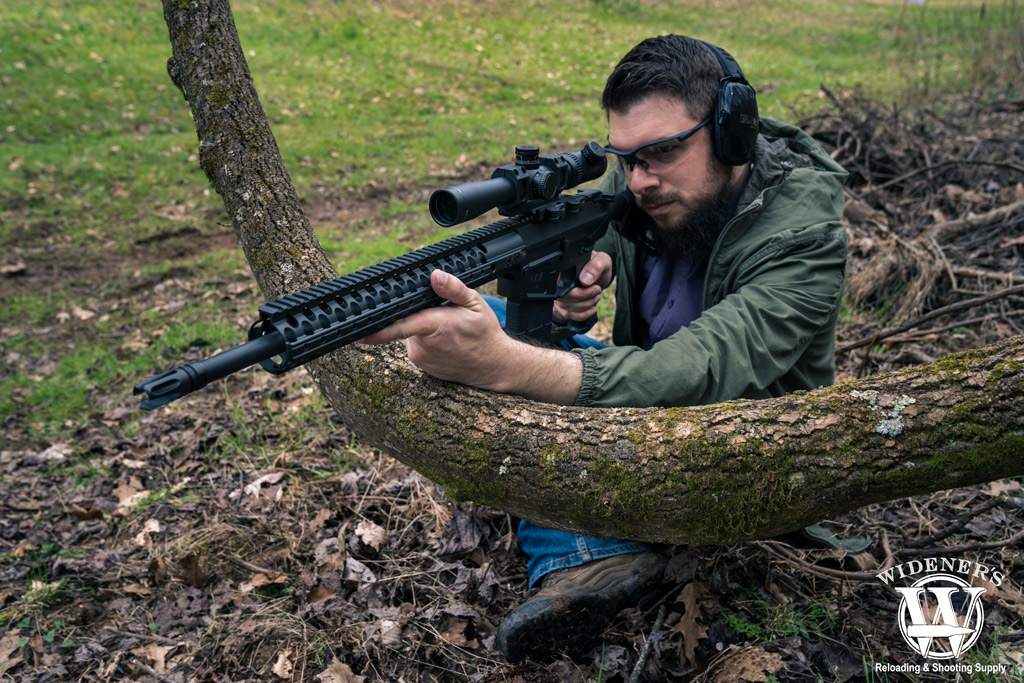
.308 bullet types have evolved over the years with many variations including bonded, poly, and ballistic tips.
The .308/7.62x51mm NATO is the world’s most popular short-action caliber and for great reason. You can visit a local big-box store, and grab a bolt action rifle chambered in .308 for $300 or less. You can also fill up your cart up with relatively cheap ammo to sight it in with. DIY builders can now assemble an excellent AR-10 for sometimes under $500. If you know where to look, you can affordably accessorize it to no end. You can also buy or custom build an incredible precision rifle and chew holes sub-MOA with the same caliber. It is so diverse, so versatile, and affordable.
Looking for more hunting ammo options for .308 rifles? Check out our handy guide to the best .308 hunting ammo on the blog.


